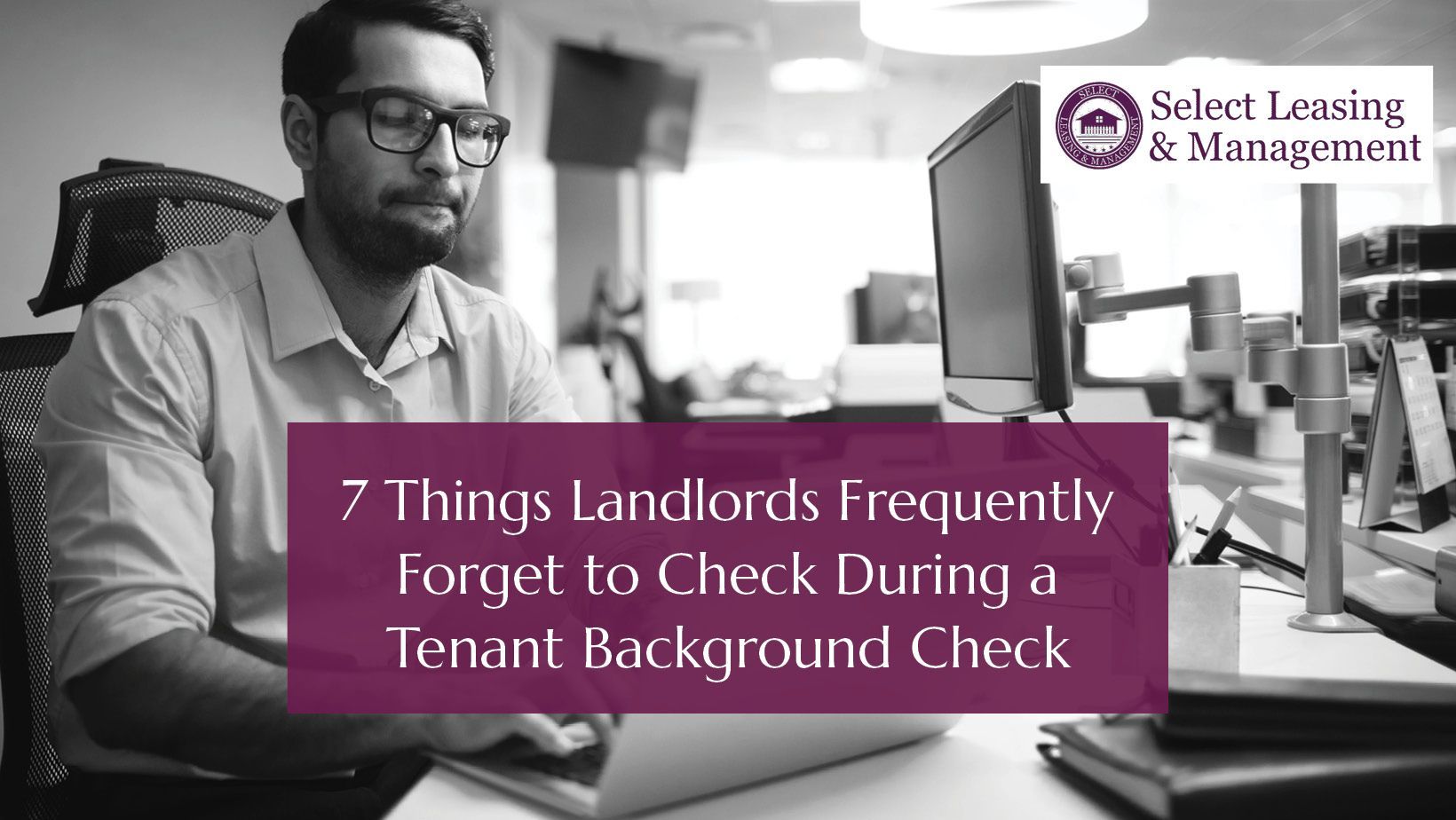7 Things Landlords Frequently Forget to Check During a Tenant Background Check

As a Landlord, you can’t just “trust your gut” when it comes to letting a new tenant move into a rental unit. Some type of tenant background check is necessary to ensure the person is who they say they are, can pay rent, and won’t cause trouble or property damage.
While there is no guarantee that someone will be a good renter or a bad one, a thorough screening process can help improve the odds. It’s also helpful to dig a little deeper than the usual questions for things landlords frequently forget, or that might be missed in a background check.
The Importance of Tenant Screening
Owning rental property is a business, and profits depend on collecting rent, minimizing expenses, and maintaining the
investment’s value. Simply put,
finding good tenants with tenant background checks is a wise business decision.
Saying “yes” to the wrong person can cause property owners a lot of problems, like:
- Unstable finances due to unpaid or chronically late rent
- Increased maintenance, repair, and cleaning if tenants mistreat the property
- Losing good tenants driven out by a neighbor’s disruption
- Safety concerns and potential premises liability due to criminal behavior
- Legal fees if eviction proceedings are necessary
The
consequences of not doing background checks are far worse than the time and money it takes to do them in the first place.
Ground Rules for a Tenant Background Check
The U.S. Department of Housing and Urban Development’s Fair Housing Act makes it illegal to turn down applicants for the following:
- Race
- Color
- National Origin
- Religion
- Sex (including gender identity and sexual orientation)
- Familial Status
- Disability
Not only is it against the law to even ask about these factors, but they have nothing to do with whether someone will be a
good or bad tenant. Far more important information can be learned from a credit check, a criminal background check, and an application that asks for meaningful information about the applicant’s rental history.
Landlords are within their rights to ask for the following:
- Employment and salary history
- Current income
- Social security number
- Driver’s license number
- Past evictions
- Credit history and bankruptcies
- Arrests, convictions, and inclusion on the sex offender list
- References
Nothing prevents a person from lying about something on this list, but the information will be included in formal screenings. Inconsistencies in what’s written on the application and what comes to light with a background check are enough to justify turning down the application.
Landlords must get written consent to do tenant background checks for both criminal history and credit scores. An applicant’s refusal to give permission is itself a red flag that the person may have something to hide. Property owners are allowed to
make background checks a requirement to consider an application.
Things Landlords Frequently Forget to Ask During Screening
Along with the standard background information listed above, there are some other things landlords can look into that can be helpful in making a rental decision. These topics can be added to the application so the answers are in writing. As long as all applicants are asked the same questions, they are not discriminatory.
1. What are the names of all occupants?
There are several reasons why knowing exactly who will be living in the rental unit is important. Ideally, all adults should be included in the lease. This way, roommates, partners, and adult children can all be screened for criminal histories and red-flag behavior. It might seem trivial, but a follow-up question asking how many vehicles will be on the premises could be relevant if parking space is limited.
Some leases include occupancy limits, either due to local laws or the landlord’s preference. This is another reason to ask for the names of both full-time and part-time occupants. Perhaps a tenant is the only full-time resident but has custody of several children on weekends or for the summer. Renting to them could violate the lease or Missouri housing standards.
2. Have you ever broken a lease or been asked to move?
Evictions are usually a last resort, so the standard question about past evictions may not give a landlord enough information. Asking these questions instead can be revealing. A past landlord may have given warnings and threatened to evict someone, but the tenant moved before they had to follow through.
Likewise, a tenant may have stopped paying rent and left before their lease expired. Either situation is a red flag. These questions can open a discussion to see if there is a reasonable explanation.
3. What is the status of prior arrests or convictions?
Everyone deserves a place to live, including those with a criminal past. Past arrests or convictions might come up for people who otherwise might be great tenants. What’s often missed in a background check is how their case was resolved or their current status.
Probing into the nature and seriousness of the crime and how long ago it occurred can tell a lot.
- Was it a misdemeanor or a felony?
- Is the case resolved or has it not yet gone to trial?
- Can a parole officer vouch for you if they were incarcerated?
- Are you in rehab or otherwise working toward rehabilitation?
- Are you in the National Sex Offender Registry?
Remember, people can be arrested for many things but are innocent until proven guilty. And even if found guilty, they may have paid their debt to society. Unless you choose to adopt a zero-tolerance policy (which is perfectly acceptable), having these conversations is helpful.
Consider, too, that an applicant who is open about their past and tells you what you will learn from a background check, may be worth a second look.

Following Up With References and Past Landlords
While asking for references is common, one of the things landlords frequently forget is to actually contact them and ask good questions. Employers will be able to confirm the applicant’s job and salary. Personal references may give some insight into the potential tenant’s character, although they’ll likely only give favorably biased feedback.
Former landlords are often the most reliable source of information. They can give an honest opinion about what it was like to rent to the individual. It’s best to talk to more than just the most recent landlord when possible. After all, if their current landlord is hoping they’ll move out, they might gloss over problems. Property owners from two or three apartments ago may be more forthcoming.
In addition to verifying the dates that the renter lived at that address, and whether they paid their rent on time, the following questions can be added to the list for the tenant background check:
4. Did the tenant have a pattern of breaking rules?
A typical lease outlines rules and regulations for things like pet policies, smoking restrictions, quiet hours and parties, subleasing, and more. If the tenant routinely needed warnings about certain behaviors or habits, that’s a red flag.
5. Did the tenant ever refuse access to the apartment?
Landlords have the right to enter a rental unit, as long as they follow some basic guidelines. If a tenant wouldn’t let them in without a valid reason, this could be a bad sign for future landlords. At best, perhaps they were only being difficult and argumentative. Worst case scenario, they were engaging in illegal activity and had something to hide.
If a former landlord shares this information, it may be helpful to ask the applicant for their side of the story.
6. Was the security deposit returned in full?
Did the tenant receive their entire deposit back, or did the landlord need to hold back some of the money to pay for cleaning or repairs? Was there damage or dirt that went beyond typical wear and tear?
If there are any concerns about how a tenant might treat the property, one option is to ask for a larger security deposit than normal. In Missouri, landlords can ask for up to two months of rent.
7. Would you rent to this tenant again?
This is perhaps the most important question to ask a former landlord. Sometimes their tone of voice or how quickly they answer can tell you as much as their actual words. For example, they may give an immediate, enthusiastic “Yes!” or “No way.” Or they may hesitate and say “I’d rather not comment.” Listen carefully. It may be necessary to read between the lines and ask some follow-up questions to get a good idea of what they really think.
Getting Help with Background Checks
It’s possible to do a background check yourself, but it can be time-consuming. You would need to check the credit bureaus and local, state, and federal crime databases. There are also tenant background check services and apps like RentPrep, MyRental, SmartMove, and RentRedi. Each one offers a different fee structure and covers different information.
Property management companies like Select Leasing & Management offer tenant background checks along with day-to-day operations for rental property. They work with landlords to develop criteria for what makes an acceptable applicant. In addition to a standard screening, they’ll ask the things landlords frequently forget to fill in the gaps missed in a background check.
Contact Select Leasing & Management to learn how we can find the best tenants for your property.
Share this post










